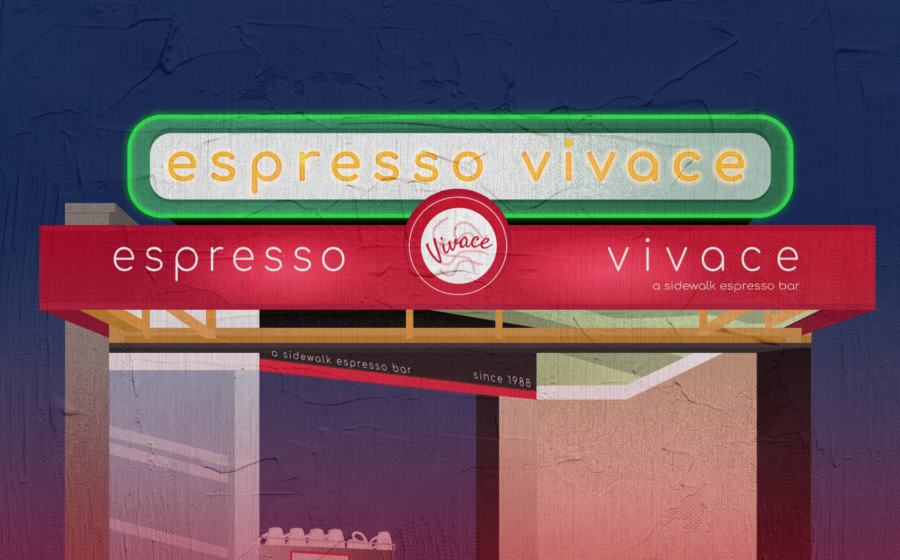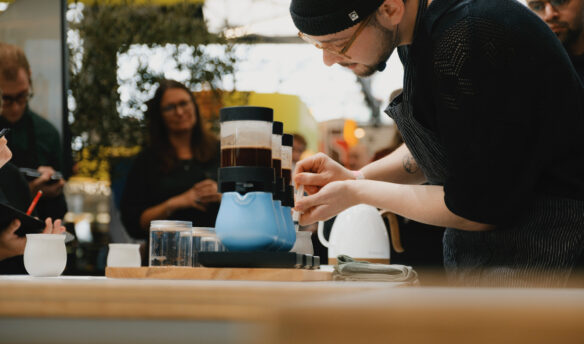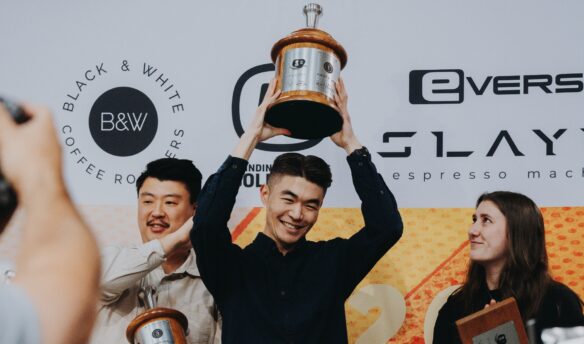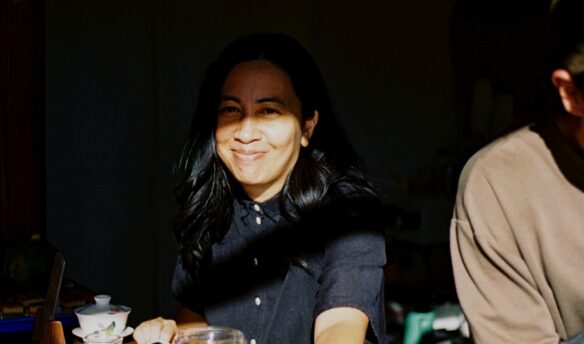As a culture, we throw around the word ‘iconic’ pretty loosely, making it a synonym for ‘great’ or a grandiose descriptor for inane occurrences—we’ve all heard someone describe a night or an experience as ‘iconic,’ the word representing a wistful hope and dream for something exciting rather than describing something genuinely life-changing. But when news broke in late April 2023 that Espresso Vivace, a thirty-something-year-old Seattle coffee chain, was closing its sidewalk location in Capitol Hill, ‘iconic’ seemed fitting. Vivace announced it would close its famous sidewalk cafe in the Capitol Hill neighborhood to focus on its two sit-down locations.
The store is not iconic because it’s old—though in our relatively young industry where we can point to a handful of things as “old,” a coffee shop that’s been open for 30+ years feels ancient and worthy of acclaim. Instead, Espresso Vivace’s sidewalk cafe is iconic because of what it represents: many attribute Vivace, and its founder, David Schomer, with popularizing latte art in the US. Schomer’s books and videos on coffee served as educational tools for many baristas beyond the reach of his direct mentoring. NBC News described him as “espresso’s exacting master” and Vivace as “the gold standard” of specialty coffee. Vivace was also where many industry leaders got their start and where many more were inspired by the potential of specialty coffee.
For many, Vivace was the epitome of the way coffee is done. The store was a signpost on the path to third-wave coffee for many of the folks who worked behind the bar; some took the lessons they learned on the sidewalk cafe and became influential coffee voices and leaders in their own right. When Vivace announced it’d be closing the sidewalk location, baristas and coffee professionals nationwide posted reflections on social media about what the shop meant to them.
People’s grief at the close of Vivace’s sidewalk location was evident in the words and voices of many people who gathered online and went in person to say goodbye. Nevertheless, the shop’s influence lives on in the careers of coffee professionals around the US.
Vivace’s Industry-Wide Impact
Before there were third-wave coffee shops in almost every major city in America—before the term third-wave even entered the zeitgeist—Espresso Vivace defined what good coffee meant. Former employees, many of whom still work in coffee, remember the impact Vivace’s innovative techniques and approach had on the industry.
Bronwen Serna worked at Vivace from 2005 to 2006; today she’s the co-host of Totally Dissolved Podcast. “The sidewalk cafe represented an amazing point in coffee history; that was the beginning of the ‘third wave’ in Seattle,” she said of the tiny sidewalk shop. Even though Vivace’s sidewalk cafe had no seating—it was basically an open-air coffee bar—people made the trek to the shop and lingered on their feet. “It was one of the most iconic neighborhood cafés that served an amazing community. Hearing that it closed made me sad and nostalgic.”
The sidewalk cafe represented an amazing point in coffee history; that was the beginning of the ‘third wave’ in Seattle. It was one of the most iconic neighborhood cafés that served an amazing community. Hearing that it closed made me sad and nostalgic. Bronwen Serna
“A lot of what you see at Vivace may not seem noteworthy today, but they were the first to do it,” former Vivace barista Alex Bernson said over the phone. Bernson got his start in coffee as a barback and barista at Espresso Vivace in the mid-2000s and has since moved into multiple roles across the coffee industry, including as an editor for the coffee publication Sprudge, helping set the tone for how people think about coffee today.
“Vivace was influential in why we drink ristrettos,” he said, referring to the shorter, more concentrated shots of espresso that came to define how other third-wave coffeeshops would pull shots. “David [Schomer] was one of the first to take that term and hone in on it.” In the 1990s, espresso was often synonymous with dark roast and bitter flavors; Vivace was one of the first cafes to challenge that monolithic flavor profile with nutty, chocolatey, and sweet espressos.
Nicely Abel also got his start at Vivace—it was his first experience working in a specialty coffee shop after working at Starbucks as a teen. He was inspired to work at Vivace after seeing baristas produce latte art, and a manager at Vivace encouraged Abel to start filming his pours for social media. The Vivace staff supported him when he decided to compete in latte art competitions, and now Abel is recognized as one of the world’s best latte artists and was the Coffee Fest World Latte Art Champion in 2010, 2011, and 2012.
The atmosphere of Vivace helped transform coffee from a caffeine vessel to an experience appreciated in its own right. Abel carried what he learned from Vivace when he moved to LA and transformed the Southern California coffee scene, helping open some of the most notable coffee bars in the city. Abel recently opened Hooked Coffee & Wine in Venice, Los Angeles, which was listed by the LA Times as one of the best coffee shops in the city.
People’s memories of Vivace inspired an outpouring of grief and love for the shop online. Not only did people leave comments on Vivace’s Instagram account, but some made posts of their own expressing how the sidewalk cafe influenced their careers and the coffee industry at large.
“Before “barista” was in almost anyone’s lexicon, much of what become coffee’s *third wave* was happening here,” wrote Tony “Tonx” Konecny, founder of the coffee subscription service YES PLZ Coffee and formerly of Tonx Coffee, one of the most influential coffee subscriptions before being bought by Blue Bottle in 2014. “The folks who worked here were meticulous, pulling extraordinary shots from a finicky but marvelous blend (with an appropriate freshness almost no shops replicate today).”
Making ‘Barista’ A Career
When Abel started working at Vivace in 2004, some of his co-workers had been working at the sidewalk cafe since it opened. “It was one of the few places in Seattle that working as a barista was considered a career,” Abel said.
Abel attributes that longevity—particularly at a time when being a barista was seen as a transitory job for young people and students—to the atmosphere developed amongst staff members. “It can be a triggering word today, but I felt a sense of real family there. [It] was a crucial moment in my life that set me on the path that I’m walking today,” Abel said.
A lot of what you see at Vivace may not seem noteworthy today, but they were the first to do it. Vivace was influential in why we drink ristrettos. David [Schomer] was one of the first to take that term and hone in on it. Alex bernson
Not only did Vivace serve as a foundational learning space, but Abel says he felt genuinely cared for and invested in. “It’s hard to encapsulate how beautiful it was for a young kid who decided not to go to college to fall into and find that. I always say I went to the University of Espresso Vivace.”
Vivace was a place where baristas were constantly challenged to grow. “I was an established barista already,” Serna says, who had won the 2004 United States Barista Championship before working at the sidewalk cafe, “but I sought out Vivace because I wanted to learn more and improve my skills.” Baristas were trained to work in all three locations, which helped them learn to adapt to different communities and bar setups. Managers also encouraged baristas to grow beyond the technical skills of making coffee, like learning how to converse with customers—always while putting quality at the forefront. “The crew working here never served a bad drink,” Konecny wrote.
The former baristas who have grown into industry leaders are one of the greatest enduring legacies of Vivace’s sidewalk café. Not only did the space give young baristas room to grow, but the high standards Schomer set encouraged employees to internalize a dedication to excellence.
“Vivace is here 35 years later because baristas have worked there for 20-plus years. Because it’s a professional craft there,” Bernson said. That legacy is essential, and many of the baristas that either worked behind the bar or frequented the cafe hold on fondly to their memories, even if they’ve since left Seattle. Some even returned to the sidewalk café for one last espresso before the gates closed a final time.
Despite the outpouring of grief for its sidewalk cafe, Espresso Vivace still lives on: they have two locations in Seattle, one just walking distance away from the sidewalk location. But for many, the closing of the sidewalk café felt like the end of an era. The legacy of Vivace, as a place committed to craft, will not be forgotten just because the sign is gone.















